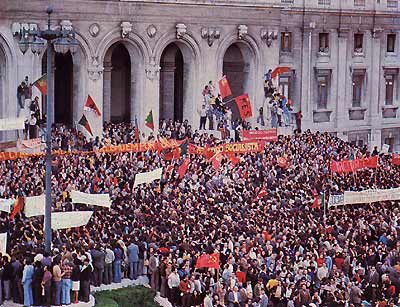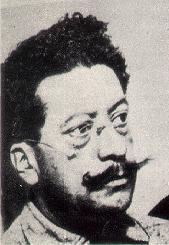Over 30 years of anarchist writing from Ireland listed under hundreds of topics
History
Review: The Friends of Durruti Group: 1937-1939
The Friends of Durruti organisation, which arose from the ranks of anarchist militants during the Spanish Civil War, condemned the CNT and FAI members who joined the anti-Franco government. For their pains they were accused of wanting to establish an "anarchist dictatorship". Alan MacSimóin reviews the first English language book about them, and looks at the lessons to be learnt from Spain. The 'Friends of Durruti' appear in just about every book on the Spanish Civil War, especially in relation to the 1937 May Days in Barcelona. They get mentioned but we are told very little about their politics or activities. Some organisations, like the Workers Solidarity Movement, see their political stance as important to the tradition of revolutionary anarchism. Other anarchists, most notably sections of the syndicalist movement, condemn them for 'flirting with Bolshevism/Leninism/Trotskyism' or for 'advocating an anarchist dictatorship'. So who were they, where did they come from, what did they say, and what did they do?
The Life, Times & Confessions of Victor Serge - The Bolsheviks' pet anarchist
Leninists are fond of quoting from the writing of Victor Serge, as a means of getting a libertarian rubber stamp for the actions of the Bolsheviks during the October revolution and the subsequent events. In his keynote article "In defence of October"[1] John Rees uses no less than 8 quotes from Serge's writings within the space of 70 pages. Poor old Lenin only managed to clock up 4 original quotes, while Tony Cliff's dubious interpretation of all these events manages to get more quotes in than one could possibly count. To a certain extent, what the Leninists of today are trying to tell us is that Serge was a practical man, and he knew that the only way for the revolution to succeed was to row in behind the Bolsheviks. So, with this in mind, we take a look at Serge's' autobiography "Memoirs of a Revolutionary".
The Militias in the Spanish Revolution - review of The Spanish Civil War by Antony Beevan
A SURPRISING BEST SELLER last year was 'Stalingrad' by the same author. His publishers have obviously re-released this book, first published in 1982, to cash in on this. As you might expect, it is primarily a military history of the Spanish Revolution. But it is a very welcome break from the normal pattern of mainstream military histories of the Spanish Revolution. For the most part these fail to discuss the revolution within the civil war, the thousands of collectives or the role of the anarchists. If they are mentioned, they are usually portrayed as an obstruction to the efficient military pursuit of the war by the republican side.
Anarchism in Action - the collectives in the Spanish Civil War
Many people would agree that the anarchist principle "from each according to their ability, to each according to their needs" is a nice idea. A self managed society with everyone having a real say in how things were run is a lovely ideal. They might nod along to the lyrics of "Imagine" by John Lennon but then equally shake their heads and tell you that such a thing could never work "in the real world". You would probably be told that people are just naturally greedy and self-centred and such a thing would end in chaos.
Brief history of anarchism in Japan
TODAY JAPAN BRINGS to mind high tech corporations, stressed out primary school students and a gruelling work ethic that demands loyalty to the company. One hundred and thirty years ago it was a very different place, predominantly agricultural and ruled over by a fuedal elite. In 1868, these rulers decided to industrialise the country and create a highly centralised state. For this reason, the Japanese experience of capitalism is different from that in many European countries.
Remembering the 1974 Revolution in Portugal
 ON APRIL 25TH 1974 a radical faction within the Portuguese Armed Forces, the MFA, revolted against the government. Until that day Portugal had been under a fascist dictatorship for over half a century. Whether the MFA was left or right wing inclined was unclear at the time. The military revolt created a space where people could effect change in their lives and the opportunity was grasped eagerly.Left-wing activists began returning from exile, and new political parties sprouted up. The parties all used the situation to gain political power in the government. Ordinary folk, in contrast, used the situation to improve social conditions in their communities and workplaces through new autonomous organisations. It was here that the true revolution was fought and is of most interest to anarchists.
ON APRIL 25TH 1974 a radical faction within the Portuguese Armed Forces, the MFA, revolted against the government. Until that day Portugal had been under a fascist dictatorship for over half a century. Whether the MFA was left or right wing inclined was unclear at the time. The military revolt created a space where people could effect change in their lives and the opportunity was grasped eagerly.Left-wing activists began returning from exile, and new political parties sprouted up. The parties all used the situation to gain political power in the government. Ordinary folk, in contrast, used the situation to improve social conditions in their communities and workplaces through new autonomous organisations. It was here that the true revolution was fought and is of most interest to anarchists.
Introduction to the Revolution in Spain (with audio version)
The extent of the democracy in Spain during the revolution was far more thorough going than anything ever achieved anywhere else in the world at any time in know history. This might seem like a grand claim but I challenge anyone to disprove it. As many of you will know there is a great deal written on the Spanish Civil War. Not just standard history and accounts of the war and its wider political impact, but personal memoirs, poems, journalistic diaries and novels. In Homage To Catalonia, George Orwell has written one of the better accounts of what it was like to be in Spain at the time. In terms of atmosphere and drama he goes a considerable way towards giving the reader some idea of the mood in Spain in 36. Orwell hints at the revolution that was taking place, and at the atmosphere of comradeship and solidarity that abounded in revolutionary Barcelona.
About the anarchist Alexander Berkman
ALEXANDER BERKMAN was born in Russia in 1870. It was a time of revolutionary upheaval, and Berkman was influenced by his uncle Maxim, later exiled to Siberia for his revolutionary activity. Joining a group of students who read the literature of the Nihilists and other prohibited organisations, Berkman was eventually expelled from school. Finding most professions barred to him, he emigrated to America. On his arrival in 1888, he quickly became involved in the anarchist movement, but, although in some ways strong, it was a divided movement.The United States at the time was opening its gates to many thousands of new arrivals, many of them from Europe. These people tended to live in the same communities as others from their country, and work in the same places. Shops, bars, and newspapers would cater for each community, usually in their native language. In Europe, the anarchist and revolutionary socialist movements were relatively strong. There was no parallel in North America, and the trade union movement was still finding its feet.
Oscar Wilde's socialism
Paris has had its fair share of famous people die in it. Most of them have ended up in the Pere La Chaise cemetery and Oscar Wilde is one of them. Of all the people buried there, that was the one grave I had to see when I entered that cemetery on a brisk March morning. I admire him because he was the master of that Irish pastime of extracting the Michael.
Biography of Mexican anarchist Ricardo Magon
 INSIDE MODERN MEXICO the name of Ricardo Flores Magon is well known, and is regarded in a somewhat similar way to that of James Connolly in Ireland. But outside Mexico few have heard of him. Born to a poor family in 1873, he became a journalist on the opposition paper 'El Demócrata' after finishing school. In 1900, along with his brother Jesús, he founded "Regeneración', a radical paper opposed to the dictatorship of Porfirio Diaz.
INSIDE MODERN MEXICO the name of Ricardo Flores Magon is well known, and is regarded in a somewhat similar way to that of James Connolly in Ireland. But outside Mexico few have heard of him. Born to a poor family in 1873, he became a journalist on the opposition paper 'El Demócrata' after finishing school. In 1900, along with his brother Jesús, he founded "Regeneración', a radical paper opposed to the dictatorship of Porfirio Diaz.

